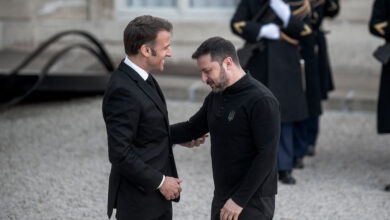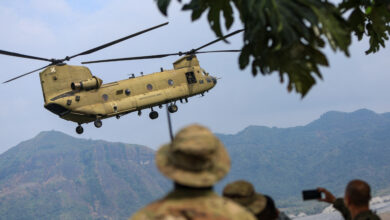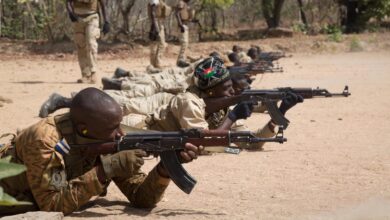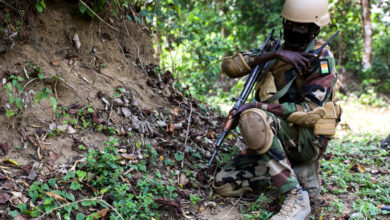The European Union will increase its presence and the level of support to its partners fighting terrorism in the troubled Sahel region of sub-Saharan Africa, the bloc’s diplomatic chief said on Tuesday, November 12.
Speaking at a press conference after a meeting of the Foreign Affairs Council in Defense Formation, the outgoing High Representative of the European Union for Foreign Affairs and Security Policy Federica Mogherini said that ministers discussed E.U. missions and operations, but that the focus of the meeting “was put on our African missions, in particular in the Sahel.”
“We have 16 missions and operations currently ongoing under the E.U. flag, with more than 5,000 men and women in uniform serving the European Union,” Mogherini said.
She said that member states had agreed with her call to ensure that E.U. missions and operations have adequate human and financial resources to fulfil their mandates.
“We have decided to increase our presence and improve the level of support we are giving to our Sahel partners,” Mogherini said. “This is an investment in European Union security, both in terms of fighting terrorism but also organized crime.”
Noting that there was no detailed discussion and no decisions were taken, Mogherini said that member states agreed to “step up their efforts and their presence to support security forces, and also their political and diplomatic efforts in the Sahel, especially in Mali.”
“There will be more coordination between the different manifestations of the E.U. there,” she added.
The ministers also “discussed the need to improve our increase in our presence and our work in the Horn of Africa,” Mogherini said, noting that the Operation Atalanta maritime mission which has been successfully focusing on anti-piracy measures “might now need to refocus also on other maritime security challenges, but that is for discussion for the ministers for the months to come.”
Mogherini’s comments come just days ahead of a key counter-terrorism summit – at the request of France, members of the U.S.-led Global Coalition Against ISIS will meet in Washington on November 14. The meeting comes after U.S. officials said in August that the U.S. will seek additional contributions from the Global Coalition Against ISIS to combat the group and its affiliates in Africa.

EU contributions to defense and security in the Sahel

The E.U. dedicates significant resources to development in the Sahel, but the key on-the-ground contribution to defense and security is European Union Training Mission – Mali, which has a mandate until May 2020 and costs around €20 million ($22 million) per year to maintain.
Around 620 troops from 22 member states and five non-E.U. states work with the Malian Armed Forces (FAMa), and around 14,000 FAMa personnel have been trained since the mission was established in February 2013.
EUTM-Mali’s objectives are to improve FAMa capacity, contribute to the political and security stabilization of Mali, and support the restoration of state control over the whole country.
EUTM-Mali also works to support the operationalization of the G5 Sahel Joint Force (FCG5S) through dedicated advice and training. Launched in 2017, the planned 4,500-strong joint counter-terrorism force comprises troops from Burkina Faso, Chad, Mali, Niger, and Mauritania.
At full operating capacity, the G5 Sahel force will have seven battalions spread over three border zones, each covering a strip 50 km (30 miles) wide on both sides of the border. It is also expected that a counter-terrorism brigade will be deployed in northern Mali.

France spearheaded the G5 Sahel initiative, but it has been undermined by lack of training, poor equipment and a shortage of funds.
Despite international pledges of hundreds of millions of dollars in financial support for FCG5S, funds have been slow to arrive. In July the European Union announced €138 million in additional funding for the force, having previously given a total of €115.6 million. In July 2018, E.U. said it would finance the construction of a new FCG5S headquarters in Mali.
United Nations Secretary-General Antonio Guterres has long-called for regular U.N. funding for the force, but the U.S. has pushed back against direct funding, preferring instead bilateral funding for individual states.
President Emmanuel Macron on Tuesday pledged to take decisions “in the coming weeks” on how France can help tackle violence in the Sahel.
He said progress had been made “on the security situation” and decisions would be announced on revamping the G5 Sahel Joint Force.
Following talks with his counterparts from Chad, Niger and Mali – Idriss Deby, Mahamadou Issoufou and Ibrahim Boubacar Keita – Macron said France was “confirming and consolidating its commitment” to its military role in the region, and that more military resources would be forthcoming by early next year.

France-led Operation Barkhane gains international support
In 2012 a Tuareg separatist uprising against the state was exploited by Islamist extremists linked to al-Qaeda who took key cities in Mali’s desert north.
France began its Operation Serval military intervention in its former colony early the next year, driving the jihadists from the towns, and the MINUSMA peacekeeping force was then established.
But the militant groups have morphed into more nimble formations operating in rural areas, and the insurgency has gradually spread to central and southern regions of Mali and across the borders into neighboring Burkina Faso and Niger. Large swathes of Mali remain outside government control, and inter-ethnic bloodshed is a regular occurrence.
The Serval mission evolved in August 2014 into Operation Barkhane, and roughly 4,500 French troops are deployed in the region, including around 2,700 soldiers in Mali.
But Barkhane has a growing international dimension, with European partners sending more troops and equipment. Denmark is to send two helicopters and up to 70 troops to support Barkhane in December and Estonia is to almost double the size of its Barkhane contingent in 2020. Chinook helicopters from the United Kingdom currently support the operation.
Operation Barkhane focuses activity in insurgent-hit Mali, Niger and Burkina Faso, and troops work alongside other international operations, including the the G5 Sahel Joint Force and the roughly 14,000-strong MINUSMA U.N. stabilization mission in Mali.
On November 5, Armed Forces Minister Florence Parly said that France expects a new international special operations task force to deploy in Mali by 2020 to help train local troops. Around a dozen countries have been approached to join the unit, named “Takuba,” which means “sabre” in the Tuareg language.
The French plans for a new Sahel task force were first reported in early October. The aim is to improve basic training for Sahelien military forces, beginning with Mali, freeing up Barkhane personnel and enabling them to focus on pursuing insurgents and preventing attacks.

Islamic State and al-Qaeda in the Sahel
Many armed groups are active in Mali and the wider Sahel region, including Islamic State-affiliated groups, but the majority of attacks are attributed to JNIM, which formed in March 2017 from a merger of several smaller groups including the Sahara branch of al-Qaeda in the Islamic Maghreb, Ansar Dine and al-Mourabitoun. JNIM’s leadership has pledged allegiance to al-Qaeda leader Ayman al-Zawahiri.
JNIM regularly reinforces its opposition to “occupier” France, and in September warned the G5 Sahel governments that attacks against their forces would continue while they support the Operation Barkhane force.
That threat was underscored in late September, when at least 40 Malian soldiers were killed in simultaneous raids claimed by JNIM in Boulkessi and Mondoro, near central Mali’s border with Burkina Faso, one of the deadliest attacks against Mali’s military in recent insurgent violence. The troops were from a battalion under FCG5S command.
Islamic State claimed two significant attacks in Mali earlier this month, saying its fighters were responsible for an attack on a military base in Indelimane that killed at least 49 people, and for a roadside bomb blast that killed a French soldier between Gao and Menaka the following day. ISIS said that attack was also in the Indelimane area.
With reporting from AFP












